Natural Testosterone Booster Foods
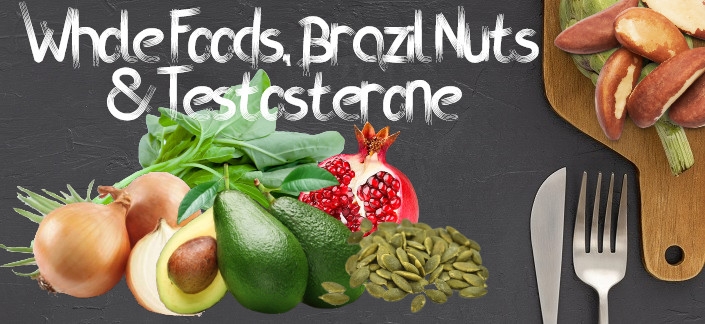
When hearing about a link between food and testosterone, most have heard at some point that oysters are the way to go. This shellfish has been touted as an aphrodisiac for decades, allegedly able to supercharge your nocturnal activities.
Certainly, if your zinc level is low, then regular consumption of oysters—cash permitting—should help to boost your testosterone level back up into the normal range. Even better, the high end of the normal range.
This is simply due to the fact that oysters are the richest dietary source for this mineral (more on zinc rich foods later).
Despite this, the most potent natural testosterone supportive food yet discovered is actually vegan sourced, which is great news for vegans, vegetarians and plant-based enthusiasts.
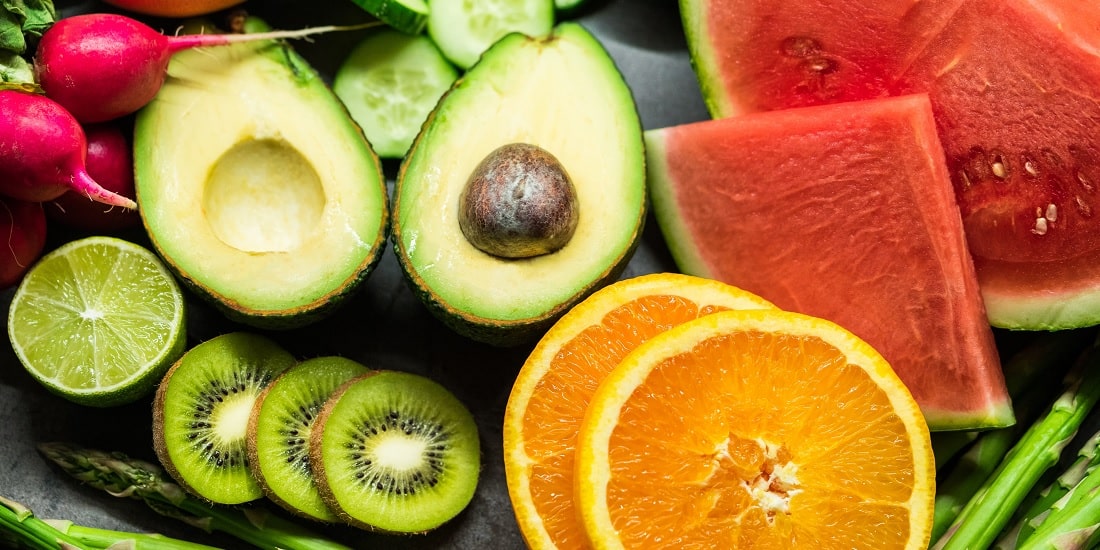
Though scientific research in the area of enhancing testosterone with whole foods is far from overflowing from your favourite search engine, fortunately some curious scientists have conducted clinical trials in this area.
There is certainly a great deal more research examining the relationship between a specific nutrient (a fraction of a whole food) and testosterone levels, such as zinc or magnesium.
This information can then be translated to whole foods, as it is simply a matter of hunting down foods rich in these nutrients.
But to be a research purist (or scientific snob?), it’s great to see the whole food clinically trialed on a group of randomized people, versus some sort of a placebo—a difficult notion in this case.
A placebo might come down to a similar food not shown to impact androgen levels. Though given the paucity of data on the topic, this might be hard.
Anyway, let’s dig in and see how you can naturally support your testosterone levels—if they are low—through the integration of specific whole foods into your diet.
This is the essence of food as medicine that Hippocrates, the father of medicine, supported around 2,500 years ago.
“Let food be thy medicine and medicine be thy food.”
Good luck ...

A Brazil Nut Digression
Before we dig into the relationship between the brazil nut and testosterone, let’s take a look at some of the basics of this interesting super food.
Brazil Nuts grow on trees that can live for up to 500 years, covering Northwest Brazil, Ecuador, Colombia, Peru, Venezuela and Bolivia. Technically, the Brazil nut is more closely related to a seed than a nut, growing in pods the size of a baseball.
When it comes to nuts, it’s easy to go overboard—they’re tasty, they’re crunchy and they’re loaded with natural oils which makes them ultra-satisfying.
However, munching down too many can turn a health-promoting food into something else entirely. Even when they’re organic and fresh.
In fact, the effect of over-eating the mighty Brazil Nut—as super-foodish as it is—can bump up your calorie intake in a real hurry, as will any nut or seed. And this might just be enough for you to gain a significant amount of body fat over a period of months.
Additionally, a high intake of Brazil Nuts on a daily basis can lead to an excessive intake of selenium. And too much of any nutrient is not a good idea, even this powerful and underrated mineral that many of us don’t get enough of.
Though grabbing fistfuls at a time and wondering why the bag is empty at the end of your favourite TV episode is as easy as breathing, Brazil Nuts are still an important food worth enjoying on a daily basis—just in a nut-counted portion.
It’s easy—1 … 2. And that’s all!
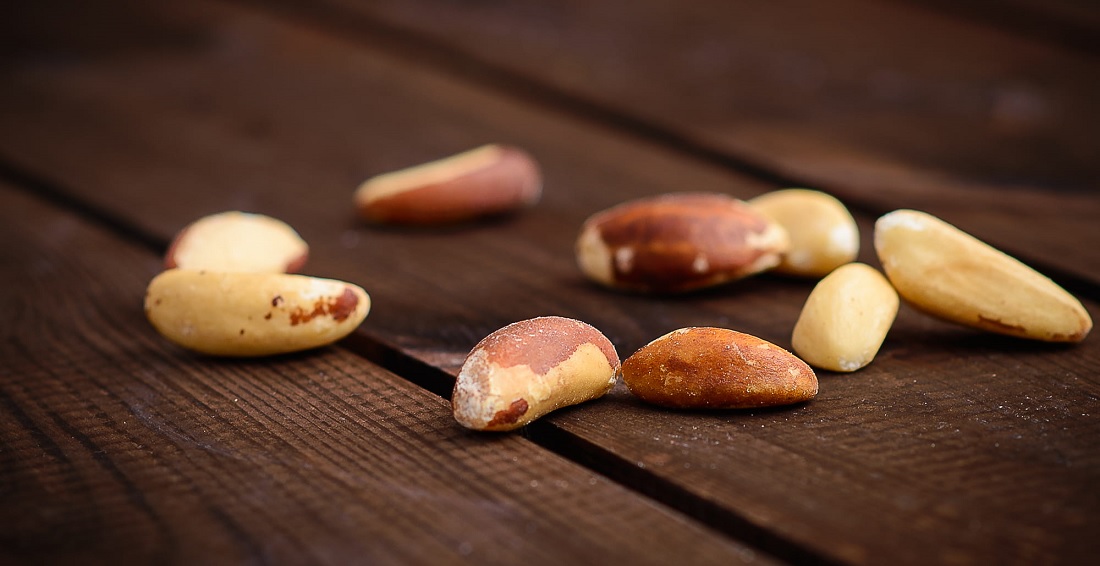
Counting out a daily portion of Brazil Nuts is a great habit to get into, just as it is for dark chocolate squares—both of which are absolute antioxidant powerhouses.
A study looking at the Total Antioxidant Capacity of 20 common foods, including chocolate, apples, beetroot and tomatoes, indicated that the two most potent were Brazil Nuts and coffee1.
Brazil Nuts are the richest dietary source of Selenium, which is actually quite an important mineral for anyone living in Australia, and especially New Zealand, as insufficiencies are quite common2,3.
A little over ten years ago a group of researchers asked a very interesting question: what’s better, selenium capsules or Brazil Nuts?
They then set out to examine the difference between eating 2 Brazil nuts daily—providing approximately 100mcg of selenium—compared to a capsule containing 100mcg of elemental selenium from selenomethionine.
The results indicated 2 Brazil nuts daily was just as effective as 100mcg of selenium in capsule form. However, the Brazil nuts were better able to increase glutathione peroxidase activity, which is important for maintaining antioxidant status4.
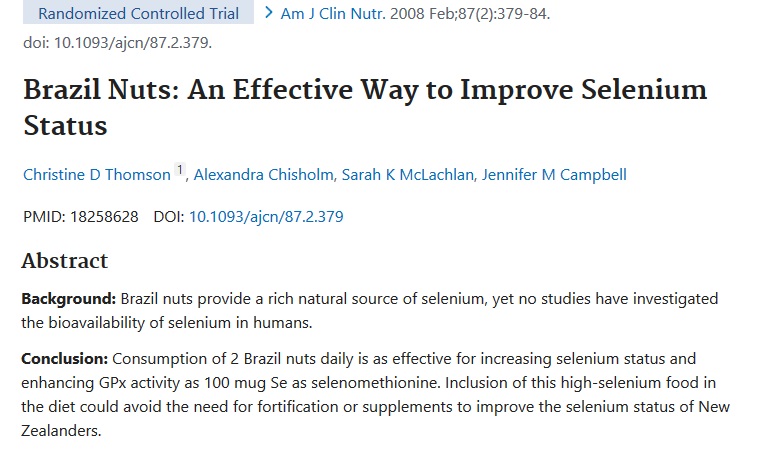
It’s worth noting, however, that there will always be strong variations in mineral content from one nut to another, just as there is in other foods, whether it’s a pickle or a root vegetable.
For instance, googling (or bing-ing or duck-duck-go-ing) the zinc content of pepitas (pumpkin seeds) will present an answer from a website, which is easy to believe as a fixed nutritional law governing the world’s pepitas.
However, these types of results are average figures, usually representative of a single test on one batch of pepitas.
A recent study examined the selenium content of brazil nuts and the soil in which they grow in different parts of the Amazon. The results showed massive variations in selenium levels, with the nuts ranging from 2.07mg/kg to 68.15mg/kg.
This result was believed to be due to variations in soil acidity and selenium content— the tree gets all of its selenium from the soil. Therefore, if the soil is low, the tree and its nuts are low in this mineral. Furthermore, an elevated soil acidity is also believed to decrease the brazil nut selenium concentration5.
As you can imagine, this kind of selenium variation can make a massive difference. Based on this research, two 5 gram nuts could contain as little as 21mcg of Selenium, or as much as 680mcg!
So if you’re going to eat them daily, sticking to a two nut limit would be a great idea, allowing yourself a break every now and then, in which you could introduce another superfood.
Apart from selenium, Brazil nuts have been found to be a good source of zinc, magnesium and copper, making this nut an overall good source of minerals— as are most nuts and seeds6.
Brazil nuts have also been shown to positively impact blood cholesterol, increasing HDL and decreasing LDL levels in an acute setting. This study was based on a single serving of 20g or 50g of Brazil Nuts. Ideally, a lower dose over a longer period of time would be best, as previously recommended7.
When it comes to testosterone levels and Brazil nuts, a research paper published in 2012 showed a strong positive correlation between selenium and testosterone levels.
Given that Brazil nuts are the richest dietary source of this mineral, they are perhaps the best suited to boosting your dietary selenium intake. And as we’ve seen, brazil nuts are just as effective, or perhaps more effective than supplement form.
Boron, Zinc & Magnesium
Mineral are some of the most important nutrients for maintaining a testosterone level that doesn’t fall below the healthy range.
So far, the body of scientific evidence for boron, zinc and magnesium seem to be the strongest for maintaining this anabolic and life-changing hormone.
Zinc deficiency is well known to contribute to low testosterone levels, even in young healthy men8.
Some of the best food for bumping up your zinc intake are in fact oysters, providing a massive 39.3mg per 100 gram. Pumpkin seeds, or pepitas, come in a distant second place at 7.81mg per 100g.
Other food sources of this essential mineral are sesame seeds, whole grains, red meat and dairy products.
Though it is hard to get anywhere near the high dosages of boron used in clinical trials to boost testosterone levels (10mg/day), certainly it is still important to regularly include food that are rich in this vital and often forgotten nutrient.
Here is a list of some of the best sources of this nutrient.
|
Food |
mg/100 g |
|
Avocado |
1.43 |
|
Peanut butter |
0.59 |
|
Peanuts, dry |
0.58 |
|
Prune juice |
0.56 |
|
Chocolate powder |
0.43 |
|
Red wine |
0.36 |
|
Granola-raisin cereal |
0.36 |
|
Grape juice |
0.34 |
|
Pecans |
0.26 |
|
Raisin bran |
0.26 |
Another mineral not often associated with testosterone is magnesium. Most tend to think of this nutrient as something to support muscle relaxation, and perhaps even bone health.
However, magnesium has a pretty solid evidence base as a nutrient that can help you keep testosterone level in the healthy range.
Research has shown that magnesium level is strongly associated with testosterone and IGF-1 levels in older men9. Supplementation intervention studies are also showing a benefit of this mineral on testosterone levels10.
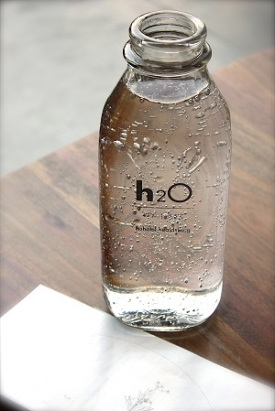
Apart from drinking water providing around 10% of our magnesium intake, the best edible dietary source is perhaps green vegetables. These wholesome foods provide chlorophyll, of which magnesium is a central mineral.
Other foods high in magnesium include almonds, bananas, black beans, brown rice, cashews, flaxseed, nuts, oatmeal, seeds (pumpkin, sesame, sunflowers) soybeans, sweet corn, tofu, and whole grains.
If you are covering your nutrient intake of important minerals, including zinc, boron and selenium you can be sure that this will go a long way to supporting your natural testosterone level, which is critical as we age.
Pomegranate, Onions and Alfalfa Sprouts
No three foods seem so unlikely to support testosterone levels as an exotic fruit, sprouts and onions. However, these are three foods that have actually been studied to see how they impact our natural level of this hormone.
And the results are in.
Perhaps most exciting are the results of the onion and published in Biomolecules in 2019. Though the majority of evidence is in males, the research indicates a range of actions for this whole food, including11:
- Increase Luteinizing Hormone.
- Reduced Free Radical Damage to Testes.
- Increased Antioxidant Defence in the Testes.
- Reduced Insulin Resistance.
- Promotion of Nitric Oxide Production in Leydig Cells.
- Altered 5’ AMP-activated protein kinase activity.
This is a pretty impressive list of action for the humble onion. Even more impressive is the fact that they are inexpensive, have a decent shelf-life and are easy to incorporate into daily diet.
Onions go great with breakfast eggs, work well on salads and in sandwiches for lunch and have limitless applications to dinner.
Another great testosterone supportive and health promoting food is pomegranate. Apart from the fact that this fruit can reduce stress and nervousness and boost wellbeing, amongst many other benefits, it has also been shown to increase free testosterone levels in men and women12.
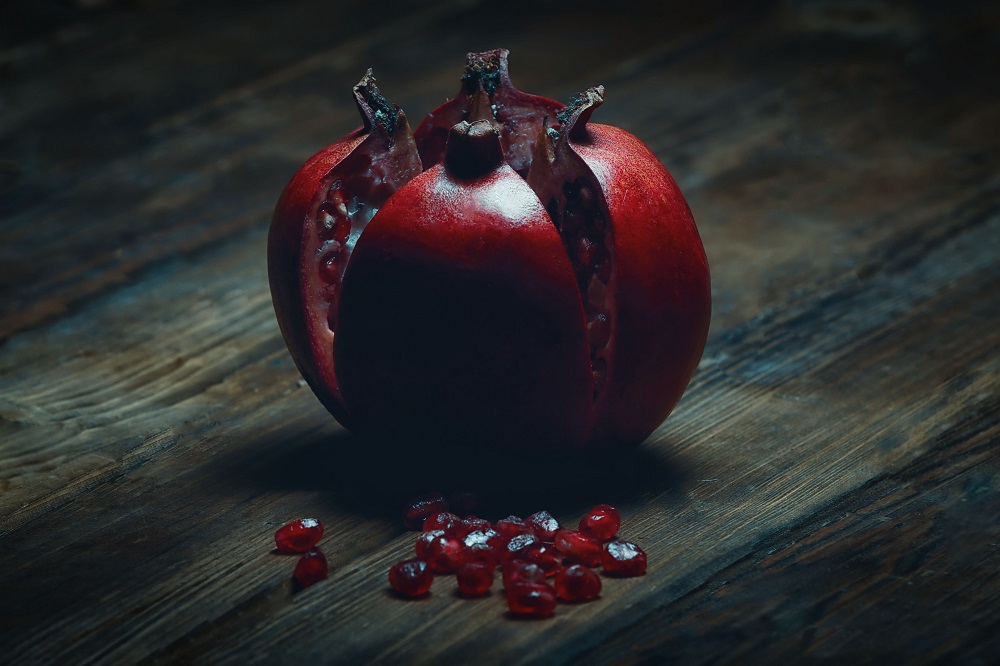
Though this fruit is quite a bit more expensive than onions, it certainly does pack some nutritional punch. You might find a good quality juice, not from concentrate, is the most cost-effective way to go.
Just don’t go overboard, as juices are not ideal in that the natural sugars are rapidly absorbed and impact blood sugar. A small amount, say 100ml, after a mixed meal containing plenty of fibre, protein and beneficial fats, is the best way to go.
And then there’s alfalfa sprouts, which are readily available, and extremely cheap if you decide to create your own at home from seeds. You don’t need a grand sprouting kit. In fact, you probably already have everything you need to get started, except for the alfalfa seeds themselves.
There are plenty of sprouting tutorials online if you want to dig in a give it a go. It can be a really rewarding experience, and is plenty of fun if you have kids.
The research indicates that alfalfa sprouts can increase free testosterone levels, on average around 15.7%. However, the results of this trial were somewhat unpredictable, as a few experienced testosterone reductions, while others had significant boosts.
It all averaged out at a 15.7% increase thought. This is where applying a mathematical model to research results can be quite misleading. Check out the original research for further details13.
Foods that Decrease Testosterone
It probably comes as no surprise that if a food can be supportive of testosterone levels, then there are some cheeky culprits out there than can do the opposite.
Here enter Omega 6 and trans fats.
Research indicates a correlation between increased Omega 6 and trans fats and decreased testicular volume. Conversely, there is a positive association between Omega 3 fats and testicular volume14
This is good news, as most westerners overeat omega 6 anyway, and need to focus on more omega 3 rich foods, such as chia seeds, linseeds (flaxseed), walnuts and of course fatty fish and seafood.

And most all know by now the importance of eradicating man-made trans fatty acids from their diet, which is essential for cardiovascular health.
When it comes to alcohol, the research points to a negative effect for alcohol on the testosterone levels of men. Avoiding drinking large amounts is important, as is not getting into the habit of drinking moderate amounts of this beverage over a long period of time15.
Final Verdict
Though it would be good to see at least another 10,000 clinical trials examining the relationship between foods, nutrients and hormone levels, the current scientific evidence can point us towards certain foods to support free testosterone levels if they are, which is likely if you are over 40 or experience low libido.
Supporting your mineral status, particularly for zinc, boron and selenium is crucial. The best sources of these are oysters, avocado and brazil nuts. There is also considerable promise for Pomegranate and onions in support of this natural hormone.
On the down side, chronic alcohol (in men), trans fats and too much omega 6 fatty acids have been shown drop testosterone levels. To remedy this, cut out the recreational drinking, avoid foods with added trans-fats and bump up your omega 3 intake.
All of these testosterone supportive recommendations are far from myopic, and provide broad ranges of nutrients given that they are in whole foods form. And the benefits of improving your diet certainly extend well beyond simply modulating one hormone.
Article Written by Gavin Deguara, ND, Nutr. Med.
References
- Ferrari CKB et al. An apple plus a nut a day keeps the doctors away: antioxidant capacity of foods and their health benefits. Current Pharmaceutical Design 2016 Vol 22 p.189-195
- Lyons G.H., et al. Selenium in Australia: selenium status and biofortification of wheat for better health. Journal of Trace Elements in Medicine and Biology. 2005 Vol 19;1 p.75-82
- Thomson CD. Selenium and iodine intakes and status in New Zealand and Australia. British Journal of Nutrition 2004 Vol 91;4 p.661-672
- Thomson CD et al. Brazil Nuts: an effective way to improve selenium status. The American Journal of Clinical Nutrition 2008 Vol 87;2 p.379-384
- Silva Junior EC et al. Natural variations of selenium in Brazil nuts and soils from the Amazon region. Chemosphere 2017
- Cardoso BR et al. Brazil Nuts: Nutritional composition, health benefits and safety aspects. Food Research International 2017 Vol 100;2 p.9-18
- Colpo E et al. A single consumption of high amounts of the Brazil nuts improves lipid profile of healthy volunteers. Journal of Nutrition and Metabolism. 2013
- Prasad A.S., et al. Zinc status and serum testosterone levels of healthy adults. Nutrition. 1996 Vol 12;5 p.344-348
- Maggio M et al. Magnesium and anabolic hormones in older men. International Journal of Andrology. 2011 Vol 34;6 part 2 e594-600
- Cinar V et al. Effects of magnesium supplementation on testosterone levels of athletes and sedentary subjects at rest and after exhaustion. Biological Trace Element Research 2011 Vol 140;1 p.18-23
- Banihani SA. Testosterone in Males as Enhanced by Onion (Allium Cepa L.). Biomolecules. 2019 Vol 9;2 p.75
- Al-Dujaili. Natural Pomegranate juice improves mood, well being and enhances Salivary Testosterone levels in healthy volunteers. University of Edinburgh April 2012
- Sasaki M et al. Daily intake of alfalfa sprouts, but not broccoli sprouts, influence plasma levels of androgen in middle-aged males. Journal of Translational Science 2018 Vol 5 p.1-6
- Minguez-Alarcon L et al. Fatty acid intake in relation to reproductive hormones and testicular volume among young healthy men. Asian Journal of Andrology. 2017 Vol 19;2 p.184-190
- Vatsalya V et al. A Review on the Sex Differences in Organ and System Pathology with Alcohol Drinking. Curr Drug Abuse Rev 2017 Vol 9;2 p.87-92









